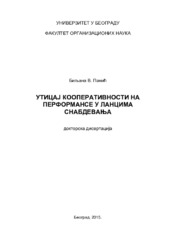Please use this identifier to cite or link to this item:
https://rfos.fon.bg.ac.rs/handle/123456789/79| Title: | Uticaj kooperativnosti na performanse u lancima snabdevanja The effect of cooperativity on performance in supply chains |
Authors: | Panić, Biljana | Contributors: | Vujošević, Mirko Vasiljević, Dragan Makajić-Nikolić, Dragana Kovačević, Ivana Dimitrijević, Branka |
Keywords: | transakciona analiza;Petrijeve mreže;performanse;lanci snabdevanja;kooperativnost;efekat biča;transactional analysis;Supply chains;Petri nets;performances;cooperativity;bullwhip effect | Issue Date: | 2015 | Publisher: | Univerzitet u Beogradu, Fakultet organizacionih nauka | Abstract: | Upravljanje lancem snabdevanja obuhvata planiranje svih aktivnosti koje se odnose na snabdevanje, kao i koordinaciju i kolaboraciju sa partnerima u lancu. Usled nedovoljne koordinacije, dolazi do pojave efekta biča. Uzroci efekta biča u lancima snabdevanja mogu biti operacioni i bihejvijoralni. Supply chain management encompasses the planning of all activities related to supply, including coordination and collaboration with partners in the chain. Lack of coordination can cause the bullwhip effect. The causes of the bullwhip effect in supply chains can be operational and behavioral. The majority of authors tackle operational causes, while behavioral are mentioned as important but are insufficiently explored. Behavioral causes, among others, include personality traits. Although the literature emphasizes the necessity of collaboration between participants in the supply chain so as to reduce the bullwhip effect, no research has been done on the effect of cooperation as a personality trait. This dissertation analyzes the impact of cooperativity of participants in a supply chain on chain costs through the implementation of a customized beer game and shows how to form a supply chain with cooperative participants. Cooperativity of participants was examined using a questionnaire in social value orientation. The general hypothesis of the dissertation was confirmed – the increase in cooperativity of participants in the supply chain can contribute to the improvement of the functioning of the chain and solving complex problems of coordination. The study of the behavioral phenomenon in the supply chain and the analysis of communication and interaction between participants in the supply chain used transactional analysis and showed how to improve the cooperativity of the participants in the formed supply chain. At the end, the behaviors of cooperative participants which gave good results were defined as the rules of conduct in the supply chain and were included in the simulation by applying Petri nets. This proved that Petri nets allow for the possibility of including a number of factors which influence the supply chains, even factors such as personality traits; therefore, the simulation by applying Petri nets can replace the real experiment. |
URI: | http://eteze.bg.ac.rs/application/showtheses?thesesId=2439 https://nardus.mpn.gov.rs/handle/123456789/4646 https://fedorabg.bg.ac.rs/fedora/get/o:10448/bdef:Content/download http://vbs.rs/scripts/cobiss?command=DISPLAY&base=70036&RID=515512474 https://rfos.fon.bg.ac.rs/handle/123456789/79 |
| Appears in Collections: | Doktorati |
Show full item record
This item is licensed under a Creative Commons License


